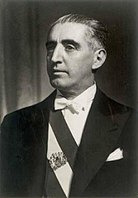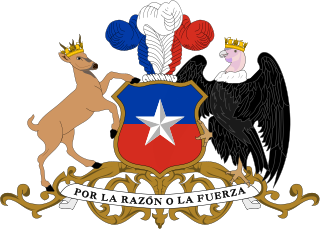
The Christian Democratic Party is a Christian democratic political party in Chile and governs as part of the Nueva Mayoría coalition.

The Communist Party of Chile is a Chilean political party inspired by the thoughts of Karl Marx and Vladimir Lenin. It was founded in 1922, as the continuation of the Socialist Workers Party, and in 1932 it established its youth wing, the Communist Youth of Chile.
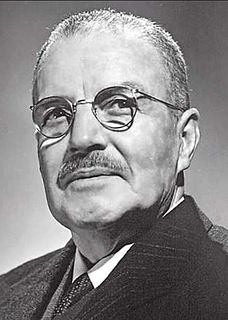
Presidential elections were held in Chile on 4 September 1952. The result was a victory for Carlos Ibáñez del Campo, who ran as an independent.

Presidential elections were held in Chile on 25 October 1938. The result was a narrow victory for Pedro Aguirre Cerda of the Radical Party, who received 50.5% of the vote.

Presidential elections were held in Chile on September 4, 1946. The result was a victory for Gabriel González Videla of the Radical Party, who received 40% of the public vote and 75% of the Congressional vote.

Movimiento Nacional Socialista de Chile was a political movement in Chile, during the Presidential Republic Era, which initially supported the ideas of Adolf Hitler, although it later moved towards a more indigenous form of fascism. They were commonly known as Nacistas.
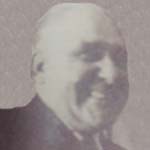
Alfredo Duhalde Vásquez was a Chilean politician who served twice as provisional president in 1946.
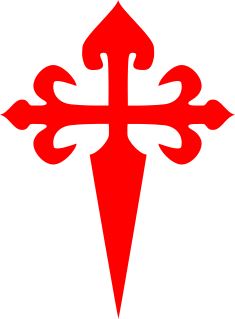
The Conservative Party of Chile was one of the principal Chilean political parties since its foundation in 1836 until 1948, when it broke apart. In 1953 it reformed as the United Conservative Party and in 1966 joined with the Liberal Party to form the National Party. The Conservative Party was a right-wing party, originally created to be the clericalist, pro-Catholic Church group.

The Radical Party of Chile was a Chilean political party. It was formed in 1863 in Copiapó by a split in the Liberal Party. Not coincidentally, it was formed shortly after the organization of the Grand Lodge of Chile, and it has maintained a close relationship with Chilean Freemasonry throughout its life. As such, it represented the anticlericalist position in Chilean politics, and was instrumental in producing the "theological reforms" in Chilean law in the early 1880s. These laws removed the cemeteries from the control of the Roman Catholic Church, established a civil registry of births and death in place of the previous recordkeeping of the church, and established a civil law of matrimony, which removed the determination of validity of marriages from the church. Prior to these laws, it was impossible for non-Catholics to contract marriage in Chile, and meant that any children they produced were illegitimate. Non-Catholics had also been barred from burial in Catholic cemeteries, which were virtually the only cemeteries in the country; instead, non-Catholics were buried in the beaches, and even on the Santa Lucia Hill in Santiago, which, in the 19th century, functioned as Santiago's dump.

The Presidential Republic is the period in the History of Chile spanning from the approval of the 1925 Constitution on 18 September 1925, under the government of Arturo Alessandri Palma, to the fall of the Popular Unity government headed by the President Salvador Allende on September 11, 1973. The period spans the same time as the "Development inwards" period in Chilean economic history.
The Democratic Alliance of Chile was a coalition of left-wing parties from 1942 to 1946, which succeeded to the Popular Front headed by Pedro Aguirre Cerda's government (1938-1941). It included the Radical Party, the Socialist Party, the Communist Party, the Democratic Party and the Workers' Socialist Party, and was also supported by the Confederación de Trabajadores de Chile (CTCH) trade-union. The coalition initial aim was to stand united before the 1942 presidential election, which were won by the Democratic Alliance's candidate, Juan Antonio Ríos, who formed a cabinet which was supported by the main parties of the Democratic Alliance. The coalition dissolved itself after the communists were outlawed by Gabriel Gonzalez Videla in 1947.
The Popular Front in Chile was an electoral and political left-wing coalition from 1937 to February 1941, during the Presidential Republic Era (1924–1973). It gathered together the Radical Party, the Socialist Party, the Communist Party, the Democratic Party and the Radical Socialist Party, as well as organizations such as the Confederación de Trabajadores de Chile (CTCH) trade-union, the Mapuche movement which unified itself in the Frente Único Araucano, and the feminist Movimiento Pro-Emancipación de las Mujeres de Chile (MEMCh).
The Radical Governments of Chile were in power during the Presidential Republic from 1938 to 1952.

Jaime Alfonso Quintana better known as Alfonso Quintana was a Chilean lawyer, politician and diplomat.
The Socialist Radical Party was a centre-left political party of Chile that existed from 1931 to 1941.



